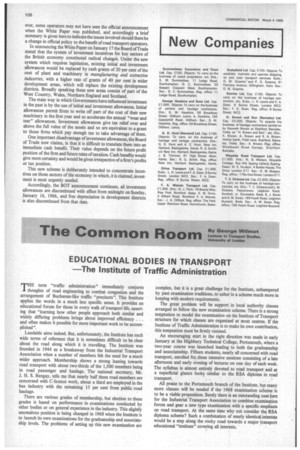EDUCATIONAL BODIES IN TRANSPORT The Institute of Traffic Administration
Page 108

If you've noticed an error in this article please click here to report it so we can fix it.
rTHE term "traffic administration" immediately conjures thoughts of road engineering to combat congestion and the arrangement of Buchanan-like traffic "precincts". This Institute applies the words in a much less specific sense. It provides an educational forum for those in every walk of transport life, asserting that "learning how other people approach both similar and widely differing problems brings about improved efficiency . . . and often makes it possible for more important work to be accomplished".
Laudable aims indeed. But, unfortunately, the Institute has such wide terms of reference that it is sometimes difficult to be clear about the road along which it is travelling. The Institute was founded in 1944 as a breakaway from the Industrial Transport Association when a number of members felt the need for a much wider approach. Membership shows a strong leaning towards road transport with about two-thirds of the 1,500 members being in road passenger and haulage. The national secretary, Mr. J. H. S. Bangay, tells me that nearly half these road members are concerned with C-licence work, about a third are employed in the bus industry with the remaining 15 per cent from public road haulage.
There are various grades of membership, but election to these grades is based on performance in examinations conducted by other bodies or on general experience in the industry. This slightly anomalous position is being changed in 1968 when the Institute is to launch its own examinations for the graduateship and associateship levels. The problems of setting up this new examination are complex, but it is a great challenge for the Institute, unhampered by past examination traditions, to usher in a scheme much more in keeping with modern requirements.
The great problem will be support in local authority classes arranged to follow the new examination scheme. There is a strong temptation to model the examination on the Institute of Transport structure for which classes are organized at most centres. If the Institute of Traffic Administration is to make its own contribution, this temptation must be firmly resisted.
An encouraging start in the right direction was made in early January at the Highbury Technical College, Portsmouth, where a two-year course was launched leading to both the graduateship and associateship. Fifteen students, nearly all concerned with road transport, enrolled for these intensive sessions consisting of a late afternoon and early evening of lectures on one day of each week. The syllabus is almost entirely devoted to road transport and at a superficial glance looks similar to the RSA diploma in road transport.
All praise to the Portsmouth branch of the Institute, but many more classes will be needed if the 1968 examination scheme is to be a viable proposition. Surely there is an outstanding case here for the Industrial Transport Association to combine examination forces and gear a new type examination with a specific emphasis on road transport. At the same time why not consider the RSA diploma scheme? Such a combination of nearly identical interests would be a step along the rocky road towards a major transport educational "institute" covering all interests.
























































































































































